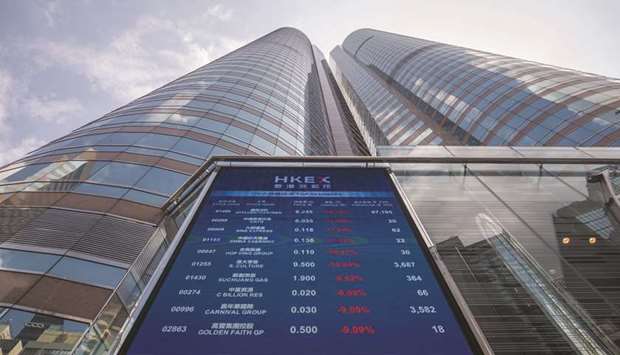The Hong Kong Stock Exchange is closing its books on a tough 2019 as virus-fuelled volatility boosts trading volumes to start the new year.
The exchange yesterday reported a 1% increase in net income and 3% gain in revenue in 2019, helped by a rise in initial public offerings as the bourse maintained its place as the world’s biggest IPO market.
That allowed it to weather a 18% drop in trading – typically its main source of revenue – as the city was rocked by anti-government protests.
Against “a challenging political and economic backdrop,” chief executive officer Charles Li said the bourse managed to post record profits for a second straight year.
“Very strong Stock Connect revenue, a buoyant IPO market and good returns from investments offset macro-driven softness in trading volumes in the cash and derivatives markets,” he said in a statement.
In early 2020, the tables have turned. Trading has boomed with investors rushing to adjust their portfolios to guard against the impact of the spreading coronavirus, while IPOs have all but come to a halt.
Looking ahead, the bourse needs to cement its role as a bridge to China after a bid for the London Stock Exchange Group Plc failed and Alibaba Group Holding Ltd was kept out of its trading link with mainland China exchanges.
The shares fell 0.7% to HK$260.6 in Hong Kong yesterday.
“A surge in cash equities and derivatives trading activity due to heightened near-term market volatility, which boosts Hong Kong Exchanges’ revenue, should more than offset the impact of a weaker pipeline of IPOs,” said Sharnie Wong, a senior analyst at Bloomberg Intelligence.
Trading exceeded HK$100bn on 16 out of 20 days after the Chinese New Year holiday, up by at least 15% from last year. Net income for all of 2019 was HK$9.39bn, compared with an estimate of HK$9.47bn in a survey of analysts. Revenue climbed 3% to HK$16.3bn.
Markets are reeling from the deepening coronavirus crisis, with Hong Kong stocks trading at the lowest evaluations in 16 years, but investors are seeing an upside for Hong Kong Exchanges & Clearing Ltd Its shares are up 2.7% so far this year, adding to a 12% gain in 2019.
The exchange typically derives the bulk of its revenue from trading fees and tariffs, while fees from IPOs were just above HK$100mn in both 2017 and 2018, though it generates millions more from other types of listings. The financial hub has played a key part in allowing Chinese investors access to selling and buying stocks, especially with Chinese authorities stepping in to limit selling earlier this month.
Li said the virus outbreak brings “renewed uncertainty,” meaning the exchange will “continue to manage costs prudently.”
But the trading boom comes as a welcome respite. Last year, the Hong Kong exchange was forced to ditch an unsolicited 29.6bn-pound ($38.4bn) bid to buy the London Stock Exchange.
The London bourse argued in its rejection that its Hong Kong counterpart was too geographically concentrated, while its business was too heavily exposed to market transaction volume.
News earlier this month that Alibaba, which made a massive $13bn listing in the city last year, won’t be able to join the trading link between Hong Kong and mainland China also highlighted the difficulties the bourse faces in forging closer connections with investors in the world’s second-largest economy.
That strategy is now seen as key to its future growth.
The CEO stressed the bourse’s top priority in deepening market connectivity to “reinforce Hong Kong’s relevance to both the East and West” as the decade unfolds.
Trading via Stock Connect – the link to Chinese markets – continued to grow into its fifth year. Northbound trading hit a record for a third consecutive year, more than doubling to a daily average of 42bn yuan ($5.98bn). Southbound trading, where mainland investors buy Hong Kong listed stocks, averaged HK$10.8bn.
The link contributed HK$1bn in revenue for the bourse.
The exchange is rated buy by 13 analysts, six have a hold and one recommends to sell, according to data compiled by Bloomberg.

A screen displays stock figures outside the Exchange Square complex, which houses the Hong Kong Stock Exchange.
